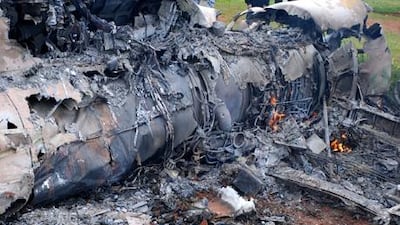NEW YORK // The United Nations Security Council last night authorised "all necessary measures" to protect Libyan civilians from harm at the hands of forces loyal to Colonel Muammar Qaddafi.
The measure allows not only a no-flight zone but effectively any measures short of a ground invasion to halt attacks that might result in civilian fatalities. It came as Colonel Qaddafi warned residents of Benghazi, the rebel capital, that an attack was imminent and promised lenient treatment for those who offered no resistance.
Ten of the council's 15 member states voted in favour of the resolution, with Russia, China and Germany among the five that abstained. There were no votes against the resolution, which was co-sponsored by France, Britain, Lebanon and the United States.
Gulf states and Jordan were "100 per cent" likely to participate in enforcing the no-fly zone but were not due to announce it formally until after the Security Council resolution had been adopted, an Arab diplomat said before the vote.
The UAE ambassador to the UN, Ahmed al Jarman, warned ahead of the vote, tof a "rapid deterioration of the security situation and humanitarian conditions" in Libya and urged council members to support the draft resolution.
In a statement, he urged the UN body to "impose a no-fly zone on Libya" and take "all the necessary measures capable of providing full protection to the Libyan people as well as the residents of all nationalities".
Before the UN Security Council votee, Libya warned it would target air and sea traffic in the Mediterranean in case of foreign military intervention, the official Jana news agency reported.
Libya's military said earlier it would halt operations from Sunday to allow rebels to lay down their arms, an apparent retreat from repeated threats by Col Qaddafi to crush them.
France, Britain and Arab League members had been pushing for a no-fly zone in Libyan airspace that would enable foreign fighters to shoot down Col Qaddafi's aircraft, one of many military advantages the Libyan leader has over the rebels.
"We have asked Qaddafi so many times to stop the violence against the civilian population" that only "coercive measures" would stop the self-styled African revolutionary from a reprisal onslaught, said France's UN ambassador, Gérard Araud.
France, Britain and the Arab League were joined on Wednesday by the United States, previously reluctant to become embroiled in another Muslim-majority country. The US ambassador to the UN, Susan Rice, called on the council to authorise steps that "go beyond a no-fly zone".
Council members were debating whether the UN resolution should allow foreign jets to attack Col Qaddafi's tanks, artillery and other ground installations that have been deployed to quash the rebel uprising against his 41-year rule.
The resolution authorises the use of "all necessary measures" to prevent civilian bloodshed in Libya, a phrase understood to permit the use of air strikes against Col Qaddafi's forces, but not a ground invasion.
Opponents to the plan had included Russia and China, both of which have veto power, and non-permanent members such as Germany and India, who voiced concern about foreign powers being sucked into an escalating civil war in a North African oil-producer.
But diplomats agreed correctly that Russia and China would be reluctant to use their veto to block a resolution that has backing from the Arab League.
France's foreign minister, Alain Juppé, before heading to New York for the vote, said the plan was backed by the Arab League, which was essential for gaining global legitimacy, and that "several Arab countries have pledged to participate in interventions". Aside from the UAE and Qatar, which are both members of the Gulf Cooperation Council, diplomats say these will most likely include Saudi Arabia and Jordan.
The resolution is expected to ban commercial flights carrying in mercenaries and arms, establish a no-fly zone and add names of more members of Col Qaddafi's circle to a list of individuals subject to travel freezes and asset bans.
In a no-fly zone, US, Nato and Arab warplanes would potentially ground Col Qaddafi's air power to protect civilians and the opposition, but hundreds of planes would probably be needed to police the skies over Libya's vast territory.
Rebel leaders in Benghazi, the insurgency stronghold in eastern Libya, warned that international assistance was taking too long and that the anti-Qaddafi uprising was struggling to hold its ground a month after it started.
Libyan state television said gunfire and explosions could be heard at the airport near Benghazi. If confirmed, it would be the first fighting near the city where the revolution started since Col Qaddafi launched his counter-attack.
Clashes around Ajdabiyah, a strategic town on the coastal highway, slowed the government advance on Benghazi, but the army warned citizens that it had the city in its sights and told them to leave rebel-held locations. Al Arabiya television reported that about 30 people had been killed in the fighting for Ajdabiyah.
Burnt-out cars lay by the roadside outside the town while Libyan government forces showed the foreign media artillery, tanks and mobile rocket launchers, much heavier weapons than those used by the rebels. Libyan state television said government forces had taken Misrata, about 200km east of Tripoli, but rebels and residents there denied the claim.
Additional reporting by Reuters


